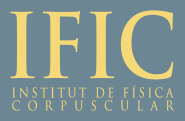About
The Institute for Corpuscular Physics (Institut de Física Corpuscular, IFIC) of Valencia is a joint research institute belonging to two institutions: the Spanish National Research Council (Consejo Superior de Investigaciones Científicas, CSIC) and the University of Valencia (Universitat de València – Estudi General, UVEG)
The mission of IFIC covers a wide range of subjects. In a broad sense, we study the fundamental interactions (gravitational, electroweak and strong) and the building blocks of matter, considering both the theoretical and experimental aspects. Our aim is to understand the nature of these interactions and their phenomenological consequences in the laboratories, to predict the behaviour in future experiments and, as a final goal, to search for a unified theory of all of them. In parallel, we wish to know which physical processes occur in the Universe, and how it has evolved from its initial conditions.
It is our aim to keep our level as an international reference centre in Particle, Astroparticle and Nuclear Physics both in the theory and experimental domains. Although IFIC is clearly oriented towards basic research, we are open to support applications that may derive from our activities on fundamental physics, such as advanced instrumentation, distributed computing and medical physics. In addition, we want to maintain and improve IFIC’s training capabilities at the PhD and postdoctoral level. Last but not least, we plan to strengthen our connection with society through our outreach activities.
GRID and e-Science In order to satisfy the computing needs of particle physics experiments such as those of the LHC, which are providing an enormous amount of data that must be recorded and analysed, a series of initiatives at CERN and the European Union have been carried out to set up a world network of computing nodes (GRID) communicating among themselves through a series of software protocols. IFIC participates in several of them with the aim of developing a model of distributed computing in Spain and in Europe. This type of development can also be interesting for the local industry and has a straightforward application to other research fields where distributed computing and communication are needed.
Services Offered
The computing centre houses several clusters with a total of 327 computer nodes (around 3500 cores) and 1.9 PB of disk storage, some of them using GRID technologies. More than 30 servers are constantly operating to provide email and web services, storage, resource management, user access, monitoring services, printing, databases, etc. The computing centre premises are located in a 150 m 2 hall with air conditioning (240 KW), technical floor and uninterruptible power supply (250 KVA).
http://webific.ific.uv.es/web/informatica
https://twiki.ific.uv.es/twiki/bin/view/ECiencia/InfraestructuraIFICGRIDCSIC
Contact

